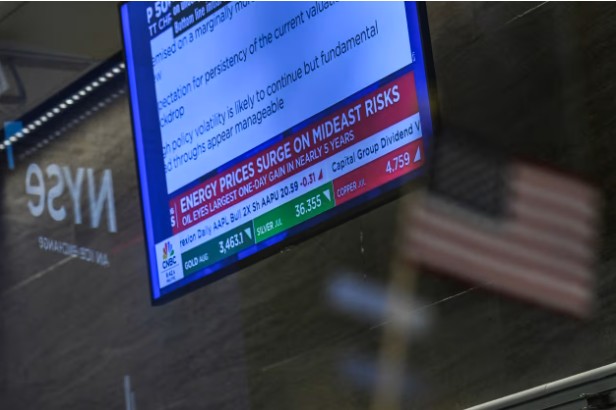
What’s Happening?
In a major escalation from June 13, 2025, Israel launched airstrikes on Iranian military and nuclear facilities—including top nuclear scientists and weapons programs—warning the operation would continue until the threat is eliminated. In response, Iran fired over 100 drones at Israel.
Why Oil Spiked
- News of the strikes caused U.S. crude oil prices to jump 6–14%, reaching highs between $72–77 per barrel.
- The market fears disruption of oil flow, especially through the vital Strait of Hormuz, which handles around 20% of the world’s oil by ship.
- This triggered talk of a potential stagflation shock—a dangerous mix of rising prices and slow growth.
Impact on Stock Markets
- U.S. stock futures plunged: Dow fell ~400–700 points, while the S&P 500 and Nasdaq dropped roughly 1% each.
- By midday June 13, the Dow was down ~403–701 points (0.9–1.6%), the S&P around 0.4–1%, and Nasdaq around 0.5–1.1%, as investors hit the panic button.
- Fear gauge (VIX) spiked ~13%.
Winners & Losers
- Winners:
- Oil producers like Exxon Mobil, Chevron, and ConocoPhillips saw sharp gains due to higher oil prices .
- Defense and weapon-makers also surged—companies like Lockheed Martin, Northrop Grumman, and RTX gained as geopolitical risks increased.
- Oil producers like Exxon Mobil, Chevron, and ConocoPhillips saw sharp gains due to higher oil prices .
- Losers:
- Airline and travel stocks (e.g., United Airlines, Carnival) fell hard as higher fuel costs hit hard and angle tourism slide.
- Tech stocks like Nvidia and Tesla each dipped over 1% due to the overall market sell-off.
- Airline and travel stocks (e.g., United Airlines, Carnival) fell hard as higher fuel costs hit hard and angle tourism slide.
Why It Matters for Everyone
- 💸 Higher energy costs: Rising oil means more expensive gas and goods—fuel and inflation could climb.
- 📉 Financial ripple effects: Drops in stock markets and jumps in bond yields affect savings, loans, and investments.
- 🌍 Geopolitical stability: Escalation risks could lead to more disruptions worldwide, not just in oil markets.
- ⚠️ Risk alerts: Analysts warn of ongoing market volatility. Countries like Greece and the UK are making safety plans for ships passing through risky waters.
🔍 Key Takeaways
| Heading | Summary |
| What’s new? | Israel launched strikes on Iran—targets included nuclear and military sites. Iran retaliated. |
| Oil shock | Prices spiked 6–14% amid fears of supply disruptions. |
| Market reaction | Global stocks fell sharply, volatility rose. |
| Winners & Losers | Oil producers and defense stocks gain; travel and tech stocks fall. |
| Why it matters | Could mean higher fuel costs, inflation, and unpredictable markets. |
Why You Should Care
Even if you’re just choosing a new phone or planning a trip, this matters. Rising oil could make everything cost more—from food to transport. Global unrest might also shake driver’s license rates, flying costs, and even your parents’ investments. Staying informed helps you understand what affects the price tags in your everyday life.
🧭 What Next?
- Oil watch: If strikes like this continue, oil could hit $100+—especially if Iran shuts down shipping lanes.
- Market swings: Expect wild up-and-down moves—watch key news and remain cautious about investing.
- Geopolitics unfolding: Future waves of violence or diplomacy might shift everything—stay updated!
✅ Bottom Line
When the Middle East heats up, your wallet feels it fast. Today’s flare-up affected oil, stocks, and global peace. Whether you’re saving up or scrolling for deals, pay attention—this could touch everything from your weekend outing to future college funds.


